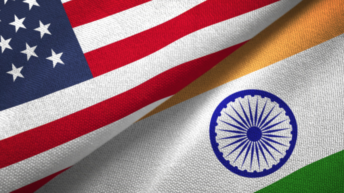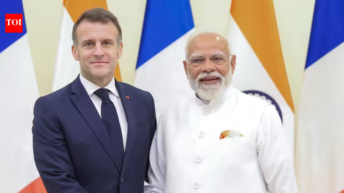
For the French Prime Minister François Bayrou, it is “a dark day for Europe… which has agreed to surrender.” For the national opposition leader Marine Le Pen, “the agreement is a political, economic, and moral fiasco.” It’s not often that one sees such consensus among political leaders—from right to left—and from the MEDEF (the French equivalent of the CII) to trade unions, in condemning an agreement reached between the European Union and the United States.
Signed on a golf course in Scotland, the trade deal between Donald Trump and the President of the European Commission, Ursula von der Leyen, can be summed up as follows: 15% customs duties on European products imported into the United States (compared to a previous goal of 0%), €750 billion in mandatory purchases of arms and energy—particularly liquefied gas—by the European Union from the United States, and at least €600 billion to be invested by EU member-states in the U.S.
As often happens with Donald Trump, the vagueness of the agreement raises many unanswered questions. While European car sales in the U.S. will no longer be taxed at 27.5% but only at 15%, and exports in the “aerospace and aviation” sectors will be exempt from duties, the steel and aluminum tariff remains at 50%. Uncertainty lingers over customs duties on many agricultural products, from champagne to cognac and wine. As Georgia Meloni, the Prime Minister of Italy, noted from Addis Ababa, we must now wait for the next round of negotiations that will determine the details of the agreement and its implementation—and the devil is often in the details…
While German chemical and automotive industries voiced token opposition, France is particularly dissatisfied with the deal. First, because agriculture is affected. Donald Trump’s statement that “European countries were closed, now they are open to our companies, to our agriculture” worries farmers, especially in France. How can they compete against products—from meat to grains—that don’t meet any of the stringent regulations they themselves must follow? What was the point of opposing the Transatlantic agreement or the Mercosur deal if a U.S.-imposed agreement violates all EU conditionalities, like those applied to China, for example? This “double standard” has nothing to do with free trade or open competition… Once again, a historic fear reemerges: that French agriculture is the great victim of German dominance in the EU’s trade negotiations.
The opposition also focuses on two key provisions of the deal: the forced sale of American energy to the EU, accused of creating a major strategic dependency, and the obligation for Europeans to massively invest in American production sites—essentially financing a competitor seeking to regain dominance. The volume of American arms purchases imposed upon the EU confirms what the war in Ukraine had already indicated: war remains a profitable venture for the American military-industrial complex. The European Commissioner for Defense’s pledge to promote a “European preference” in arms procurement now sounds like wishful thinking. What is the war project against Russia, if not a commercial guarantee for American arms manufacturers—ready to fight to the last Ukrainian to increase their sales and turn Europeans into captive buyers? Donald Trump has ensured that European defence becomes America’s defence of Europe (for a price).
Who, then, is still speaking of strategic autonomy?
The agreement is clearly unbalanced.
To avoid a trade war and the dreaded “30% tariffs,” the President of the European Commission capitulated. European businesses will bear the costs—especially since, on top of the 15% tariffs, there is also the impact of the dollar’s devaluation (around 10% against the euro), making European products sold in the United States about 25% more expensive.
And here emerges the real issue behind a deal that, while it is commercial on the surface, is also—and profoundly—political. This agreement conveys three core messages:
First, that the stronger party imposes its conditions, and that Donald Trump’s famed “art of the deal” is, above all, the art of crushing the weaker side. Visibly, the European Union is powerless against the United States, given that the United Kingdom alone secured a better deal than the EU-27!
Those who speak of “European sovereignty” should reflect on the total surrender of independence once again displayed by von der Leyen. Who still remembers that Germany and Italy are countries under continued American occupation, forced to host U.S. military bases and thousands of U.S. soldiers enjoying extraterritorial status? The European Union has been occupied since 1945, and “the Iron Curtain never fell.” A cruel historical reminder—and a painful present reality—as a U.S. general provocatively threatened an invasion of Kaliningrad, thus legitimising the Russian nuclear threat!
Second, those who still use old terms like “rule of law,” “free markets,” “equal access and open competition,” “global marketplace,” etc.—the slogans of a naïve globalisation under the banner of free trade and market supremacy—have corpses in their mouths. The law of trade is now the law of the strongest. Everything is political, everything is weaponised, and anything that can be used to threaten, coerce, or destroy is being used.
The weaponisation of international trade is now a reality – sending thinkers like Friedman, Adam Smith, and Ricardo back to prehistory. It is now up to today’s economists to describe the world that is coming.
And it is up to the still-clear-headed European nations to work for containing American pressure by cooperating with China, with India, with the BRICS today, – and of course, with Russia tomorrow – to rebuild a balance of power, the only credible path to peace.
Finally, and this is perhaps the gravest issue: the European Union has become a tool for a new kind of colonisation—the colonisation of European nations by the United States, which intends to turn them into its backyard, tightly controlled and dependent.
Close allies of Donald Trump are said to have boasted that the agreement imposed on the EU would bring over $1 trillion in earnings to the American economy! The Maidan coup in Ukraine, the provocations against Russian populations, the deception of the Minsk Agreements—all had the strategic effect of cutting German industry off from cheap Russian energy and from the Eastern European production basin that included Belarus. Similarly, the massive American political manipulation of CO₂ emissions and shift to electric vehicles had the effect of crippling the German and French automotive industries.
A 100% win for the United States!
The double-barreled strategy—first demanding that European nations double or triple their defense budgets, and then forcing them to buy American—is simply called “forced sale” and reveals the mental submission of EU leaders, probably selected for their willingness to comply. How else can their deafening silence after the US-backed sabotage of Nord Stream 2 be explained?
The astonishing EU commitment to invest €600 billion in the United States simply means that the Union is financing American multinationals that will crush their European competitors. In other words, “the European Union” is just another name for the American occupation of European nations.
A grim prospect is that the European Union is being dragged—against the will of its citizens—into a conflict with Russia, following the surreal decision to appoint the representative of a Baltic state, (hysterically anti-Russian), as the head of European defence (and another Baltic politician as the Foreign Affairs Commissioner) while the European Union is being forced to contribute to the “containment,” and eventually the hoped-for dismantling of China, an objective that some American think tanks are already calling for—or should we say, preparing?
If one conclusion can be drawn, it is this: Donald Trump is ready to fight Russia and China down to the last European—at the very moment when his envoys are pressuring African governments to cancel mining permits granted to Chinese, Indian, or Turkish companies, and when others are negotiating with Myanmar for access to rare metals as a means of sidelining China.
In this way, a new “Thirty Years’ War” is being prepared to divide and devastate the Eurasian continent—a war for which the 1.5 million victims of the U.S.-initiated conflict against Russia in Ukraine are just a prelude. (The original Thirty Years’ War, concluded by the Treaty of Westphalia in 1648, killed a third of Central Europe’s population.)
France commemorates every year the Resistance against Nazi occupation, and the courage of General de Gaulle, who defied every convention and dared to reject France’s capitulation, earning his place alongside the Soviet Union, the United States, and Great Britain in the Allied victory.
In the face of a new financial, industrial, and commercial occupation, will France be able to break free from the rusty shackles of the Atlantic alliance and a so-called civilisational community that loses more of its meaning by the day?The open disrespect of France, when the President of the United States declared, for example, that Emmanuel Macron’s decision to recognise the State of Palestine is meaningless and holds no authority, should rally the French.
There was a time when insulting the President of France meant insulting the French people. In the face of the American big bully, do the French still remember that?
And will they have to relearn—through blood and tears—what “resistance” truly means?






Add comment